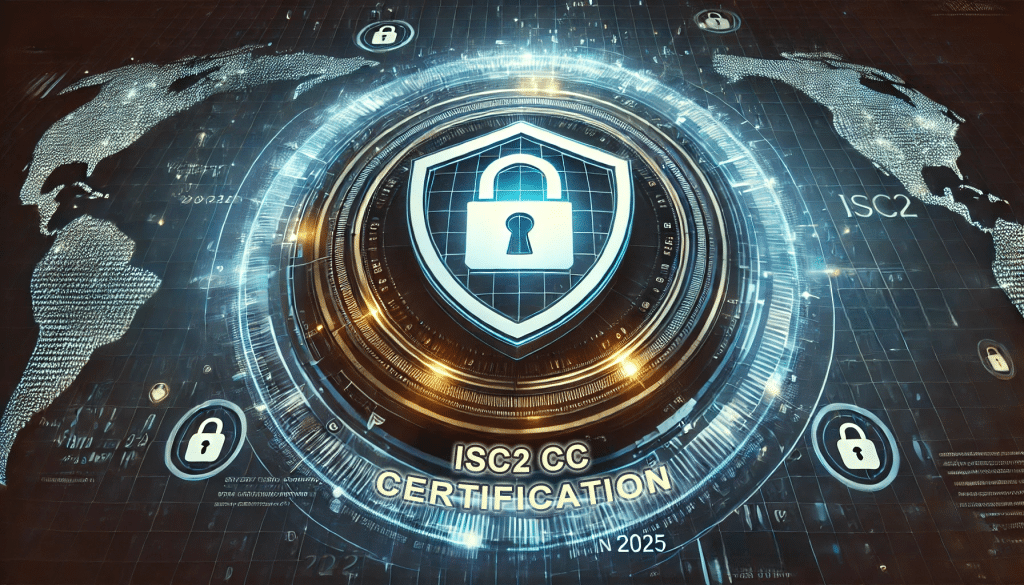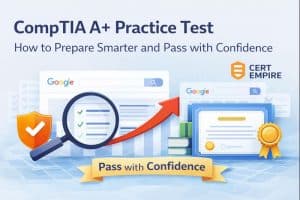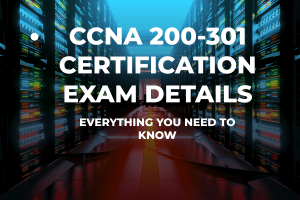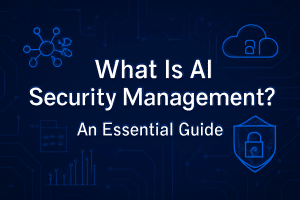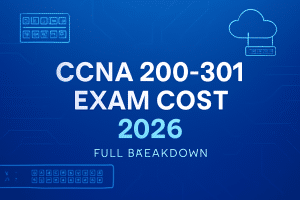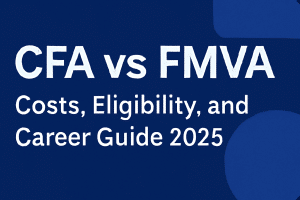The cybersecurity field is growing faster than ever, and staying ahead means having the right certifications. One of the standout credentials in 2026 is the ISC2 Certified in Cybersecurity (CC) certification. Whether you’re just starting your cybersecurity career or looking to validate your skills, this certification offers a strong foundation in essential cybersecurity concepts.
But what makes the ISC2 CC certification special? And how can it help you land exciting roles in a highly competitive industry? In this post, we’ll explore everything you need to know about the ISC2 CC, from what it covers to how to prepare for the exam to become a certified cloud security professional.
Why the ISC2 CC is Gaining Momentum in 2026?
Cyber threats aren’t slowing down—they’re becoming more sophisticated, and businesses need professionals who can keep up. The ISC2 CC caters to this demand by offering a no-nonsense way for candidates to prove they’re ready to handle entry-level cybersecurity roles.
The ISC2 CC was designed for beginners, so you don’t need years of experience or a deep technical background to earn it.
In 2026, more individuals are starting to see this cert as their “foot in the door” for the industry. Employers are also recognizing its value, prioritizing candidates who’ve proven they can handle the basics under ISC2’s trusted framework.
Additionally, ISC2 has simplified its certification process, removing barriers like costly prerequisites. The “One Million Certified in Cybersecurity” initiative has made the exam accessible to a broader audience, giving people a chance to break into tech at a fraction of the usual cost.
How This Certification Stands Out Among Cybersecurity Credentials
There’s no shortage of cybersecurity entry level certification top-level certs—CompTIA Security+, EC-Council’s CEH, and Cisco’s CyberOps Associate are just a few examples. So, what makes the ISC2 CC special?
Beginner-Friendly Without Sacrificing Depth
Some certifications are overwhelming for newcomers. They throw technical jargon at you from the start, making you feel like you’re drowning. ISC2 CC, on the other hand, is designed to be approachable. It doesn’t assume you’re a tech genius. It introduces key core concepts but in a way that feels manageable without watering down the content.
Global Recognition
ISC2 is well recognized certification respected worldwide. Employers trust their certifications because they know the organization prioritizes quality and practical skills. Whether you’re applying for a job in the U.S., Europe, or Asia, the ISC2 CC carries weight.
For professionals aiming to understand how this certification impacts job prospects and earning potential, exploring job roles and salary insights is crucial. A detailed resource is available at https://certempire.com/job-roles-and-salary-insights-for-isc2-cc-certified-professionals to help you align your career goals with market demands.
Aligned with Current Job Market Needs
Unlike some certs that feel outdated the moment you pass the exam, ISC2 CC is aligned with what employers are actively looking for in 2026. Companies don’t just want someone who can memorize terms, they need professionals who can apply their knowledge in real-world scenarios. The ISC2 CC is structured to meet these demands.
Affordable Entry Point
Let’s face it: certifications can get expensive, and not everyone has the resources to invest thousands of dollars. ISC2’s initiative to make this cert more affordable has been a game-changer. By lowering the financial barrier, they’ve opened doors for countless individuals who might not have considered cybersecurity as a serious career path before.
Professionals Who Benefit the Most from This Certification
While the ISC2 CC is beginner-friendly, it’s not limited to newcomers. Many IT professionals, managers, and even non-technical individuals are finding value in earning this certification. Here’s a breakdown of who benefits the most:
IT Professionals Exploring Cybersecurity
If you’re already in IT but haven’t worked specifically in cybersecurity, this cert is a great way to transition. It allows IT admins hiring managers, support staff, and network engineers to build a foundation in security concepts, which can enhance their current roles or help them move into cybersecurity-focused positions.
Career Changers
People from unrelated fields like finance, education, or even healthcare can use a certificate for the ISC2 CC as a gateway to pivot into cybersecurity. The cert is designed to help individuals prove their potential, even if they don’t have prior experience in tech.
Students and Fresh Graduates
College students or recent grads aiming for cybersecurity roles can benefit greatly. The ISC2 CC can make a resume stand out by showcasing that the individual is serious about cybersecurity and has validated their skills through a globally recognized certification.
Managers and Decision-Makers
Even professionals in non-technical roles, such as project managers or business analysts, can benefit. Understanding cybersecurity fundamentals helps them make better decisions, align with security policies, and collaborate effectively with technical teams.
Freelancers and Consultants
For freelancers or consultants working in tech, having the ISC2 CC adds credibility. It shows clients that they understand security basics, which can lead to better opportunities and trust from clients.
How ISC2 CC Bridges the Gap for Mid-Level Cybersecurity Roles
The ISC2 CC is primarily an entry-level cybersecurity certification, but its influence doesn’t stop there. It also serves as a bridge for professionals aiming to progress toward mid-level cybersecurity roles.
Here’s how it helps:
- Solid Foundation for Advanced Certifications
Certifications like CISSP, CISM, and even CompTIA Security+ often require some baseline knowledge. The ISC2 CC ensures you have the basics covered, making it easier to tackle advanced certifications in the future. - Proves Practical Skills to Employers
Even if you’re already working in IT or a related field, employers often want to see proof that you understand cybersecurity fundamentals. The ISC2 CC fills that gap, providing a trusted credential that highlights your competence. - Upskilling for Non-Security IT Roles
IT professionals who don’t specialize in security but interact with security systems (e.g., system admins, network engineers) can use the ISC2 CC to enhance their capabilities. This helps them step into hybrid roles where security knowledge is critical. - Entry to Specialized Cybersecurity Domains
Once certified, you can explore more focused domains like incident response, threat analysis, or penetration testing. The ISC2 CC acts as a springboard, giving you the confidence and credentials to pursue these specialized areas.
- If you’re deciding between these two paths, our CC vs Security+ guide highlights where each cert fits best for entry-level cybersecurity careers.
What Does the ISC2 CC Exam Test You On?
The ISC2 Certified in Cybersecurity (CC) exam focuses on foundational cybersecurity concepts, making it an ideal choice for training those new to the field. The exam is designed to evaluate your understanding of critical security principles, ensuring you can handle basic tasks and think like a cybersecurity professional.
This isn’t just about memorizing definitions or theoretical knowledge. The exam digs beyond foundational knowledge and into practical, real-world concepts, preparing candidates to tackle challenges like identifying threats, understanding security protocols, and managing basic security tasks in any work environment.
To see how ISC2 CC compares directly with advanced credentials, check our ISC2 CC vs CISSP analysis, which maps how each serves different stages of a cybersecurity career.
Core Cybersecurity Domains You’ll Master
The ISC2 CC exam covers five key domains, which are carefully chosen to reflect the core competencies required for entry-level roles in cybersecurity. Here’s a closer look at these domains:
- Security Principles
- Understanding the fundamentals of cybersecurity, including confidentiality, integrity, and availability (the CIA triad).
- Learning about key concepts like access control, authentication, and least privilege.
- Gaining insights into why cybersecurity is critical for organizations of all sizes.
- Risk Management
- Recognizing, assessing, and responding to security risks.
- Learning about basic risk management frameworks and processes and disaster recovery.
- Identifying threats and vulnerabilities that can impact systems and data.
- Incident Response and Business Continuity
- Understanding the steps to identify and respond to security incidents.
- Basics of creating and implementing an incident response plan.
- Ensuring systems and processes can recover quickly from disruptions.
- Network Security
- Fundamentals of securing networks, including firewalls, VPNs, and encryption.
- Understanding network protocols and their role in maintaining security.
- Identifying common network-based attacks and defenses, through incident response concepts.
- Security Operations
- Learning how to monitor systems for potential security breaches.
- Familiarity with security tools and technologies used in day-to-day operations.
- Basics of logging, auditing, and reporting, and cybersecurity best practices.
These domains ensure that certified professionals are well-versed in the essentials of cybersecurity and prepared to step into entry-level roles with confidence.
Key Skills Validated by the Certification
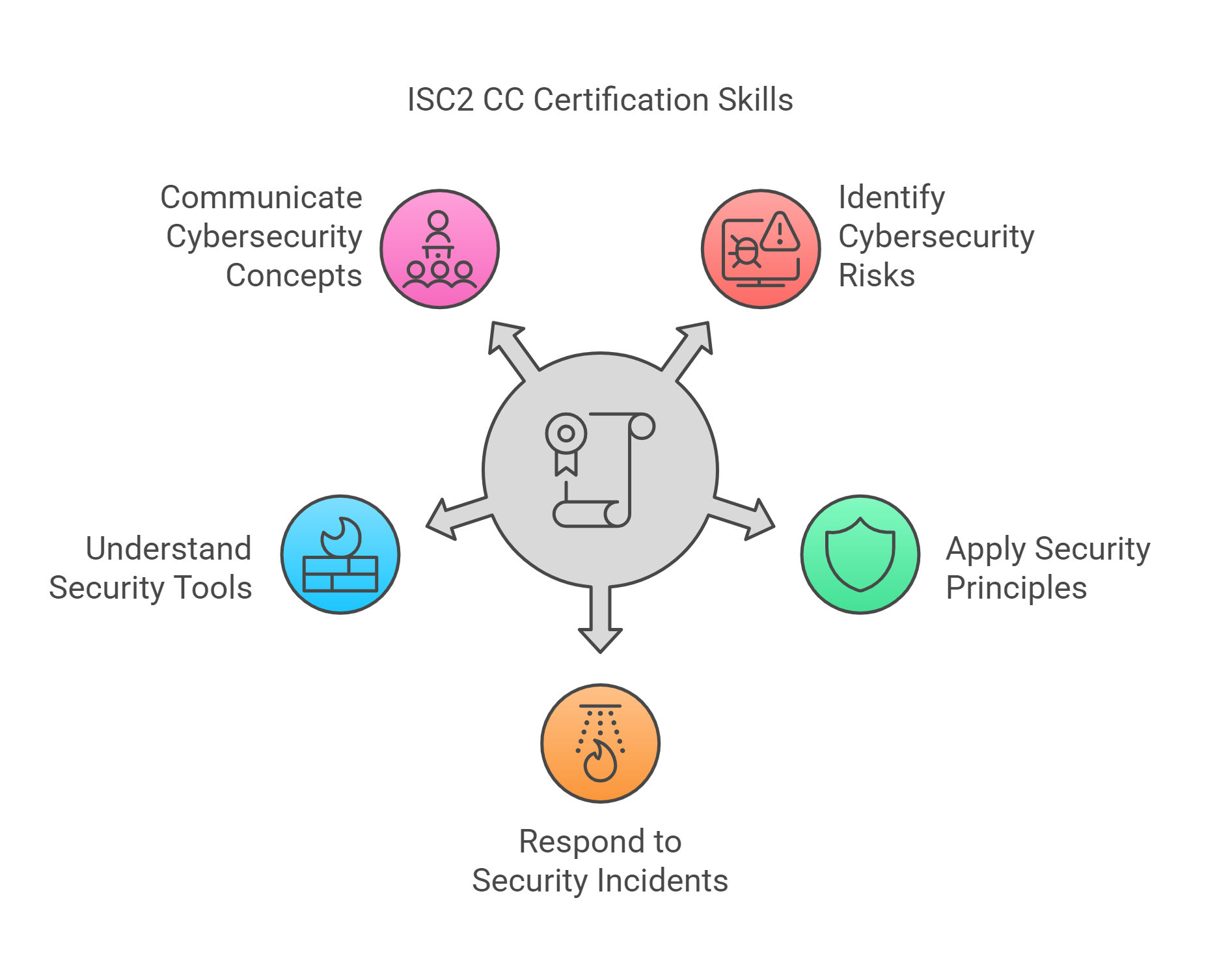
The ISC2 CC doesn’t just test knowledge. It ensures candidates have the skills employers care about. By earning this certification, you prove you can:
- Identify Cybersecurity Risks: Recognize common threats and vulnerabilities in networks, systems, and applications.
- Apply Security Principles: Implement best practices like least privilege, secure configurations, and proper access controls.
- Respond to Security Incidents: Follow a structured approach to identify, contain, and resolve security incidents.
- Understand Security Tools: Use tools like firewalls, intrusion detection systems (IDS), and antivirus software effectively.
- Communicate Cybersecurity Concepts: Explain key concepts to both technical and non-technical audiences.
These skills make you job-ready and demonstrate to employers that you’re prepared to contribute to their security efforts immediately.
You can also explore our full breakdown of CC Job Roles and Salary Insights to see exactly how this certification pays off in different industries.
Breaking Down the ISC2 CC Exam: Format and Structure
The ISC2 CC exam is structured to assess foundational cybersecurity knowledge in a clear, straightforward manner. Whether you’re a beginner or transitioning into cybersecurity, understanding the exam format is crucial to your success. The ISC2 has designed this exam to test practical, real-world knowledge, making it accessible without overwhelming candidates with overly technical content.
How Many Questions You’ll Face and What Types to Expect
The ISC2 CC exam consists of 100 multiple-choice questions. These aren’t your average “definition-based” questions; instead, they aim to test your ability to apply cybersecurity concepts in real-world scenarios.
Question Types:
- Scenario-Based Questions: These present a hypothetical situation, asking you to choose the best course of action or identify the issue.
- Basic Concept Questions: Cover straightforward topics like the CIA triad, access control, and network protocols.
- Operational Questions: Focus on practical knowledge, such as recognizing security risks and responding to incidents.
The mix of question types ensures you’re not just memorizing information but also understanding how to use it effectively.
Time Limits and Passing Scores Demystified
You’ll have two hours (120 minutes) to complete the exam. This time frame is generous for most candidates, giving you ample opportunity to carefully read and analyze each question.
- Passing Score: The ISC2 CC uses a scaled scoring system, where you need to achieve a minimum of 700 out of 1,000 points to pass.
- Scoring Breakdown: Each question carries a different weight, so answering correctly on more complex or scenario-based questions may contribute more to your final score.
Since the scoring system isn’t linear, guessing on harder questions won’t hurt you as much as leaving them blank. Always make an educated guess if you’re unsure!
Why ISC2’s Exam Style Favors Analytical Thinkers
The ISC2 CC exam is designed to test not only what you know but how you think. It rewards analytical thinking and problem-solving skills over rote memorization.
- Real-World Focus
Many questions simulate real-world challenges, such as identifying a phishing attempt or securing a vulnerable system. Analytical thinkers can break down these scenarios, weigh options, and select the most logical solution. - Scenario-Based Learning
This style pushes candidates to think critically. For instance, a question might describe a network vulnerability and ask which security control would mitigate the issue. Instead of testing if you’ve memorized terms, it assesses your ability to apply them effectively. - Elimination Strategy Encouraged
With multiple-choice questions, analytical thinkers can use the process of elimination to rule out incorrect answers, narrowing down to the best option even if they’re unsure. - Aligned with Job Expectations
Cybersecurity jobs often involve quick thinking and analyzing data under pressure. By mimicking these challenges in the exam, ISC2 ensures candidates are prepared for the actual demands of the role.
Preparing for the ISC2 CC: What Really Works?
Passing the ISC2 CC exam requires a focused and strategic approach to preparation. With the right mix of resources and techniques, you can maximize your chances of success and build a rewarding career with a strong foundation in cybersecurity concepts. It’s not just about studying hard but studying smart, using tools that match your learning style and reinforce your knowledge effectively. For a complete roadmap to success, check out How to Pass the ISC2 CC Exam – Your Ultimate Study Guide.
Study Guides, Practice Exams, and Hands-On Labs
The cornerstone of your preparation should be a combination of study guides, practice exams, and hands-on labs, each serving a unique purpose:
1. Study Guides
Why They Matter: Study guides are your primary resource for understanding exam topics. They break down the ISC2 CC domains into manageable sections, ensuring you cover everything from security principles to risk management.
Best Options: Look for ISC2’s official study materials or trusted third-party guides that align with the current exam syllabus. Popular options include the ISC2 Certified in Cybersecurity Official Study Guide and guides from reputable publishers like Wiley.
How to Use Them: Read actively—highlight key points, make notes, and revisit challenging sections. Focus on understanding concepts rather than just memorizing them.
2. Practice Exams
Why They’re Crucial: Practice exams help you simulate the real test environment, improving your time management and familiarizing you with the question format. They also highlight weak areas, giving you a chance to address them before the actual exam.
Where to Find Them: Official ISC2 practice exams are a reliable choice. Many online platforms, like Boson or MeasureUp, also offer high-quality, realistic practice tests.
Tips for Success: Take multiple practice exams and aim to score at least 80% consistently. Analyze your mistakes to understand where you need improvement.
3. Hands-On Labs
Why They Stand Out: Cybersecurity isn’t just theoretical; it’s highly practical. Hands-on labs let you apply what you’ve learned in real-world scenarios, such as configuring firewalls or identifying vulnerabilities.
Best Platforms: Use platforms like TryHackMe, Hack The Box, or CyberSec Labs, which offer beginner-friendly challenges aligned with ISC2 CC topics.
How They Help: These labs reinforce your understanding of key concepts and prepare you for practical job tasks, not just the exam.
Exam Dumps by Cert Empire
Exam dumps can be a helpful tool if used ethically and wisely. Cert Empire is a trusted platform known for providing updated and verified ISC2 CC dumps https://certempire.com/exam/isc2-cc-pdf-dumps/ that reflect the actual exam questions.
Why Cert Empire Exam Dumps Are Useful:
Accurate Question Pool: Cert Empire’s dumps include real or near-real questions, giving you a clearer idea of what to expect.
Boosting Confidence: Familiarity with question types reduces anxiety and boosts confidence.
Quick Review: They allow you to test your knowledge on likely exam topics in a short time.
FAQs
How Long Does It Take to Prepare for the ISC2 CC?
On average, it takes 4–6 weeks of focused study to prepare, depending on your background and the limited time that you can dedicate daily.
Can You Pass the ISC2 CC Without Prior Experience?
Yes, the ISC2 CC is designed for beginners, so you don’t need prior experience. Strong preparation and the right resources are key.
What Happens If You Fail the Exam?
You can retake the exam after a 30-day waiting period. ISC2 allows up to three attempts within a 12-month period.

